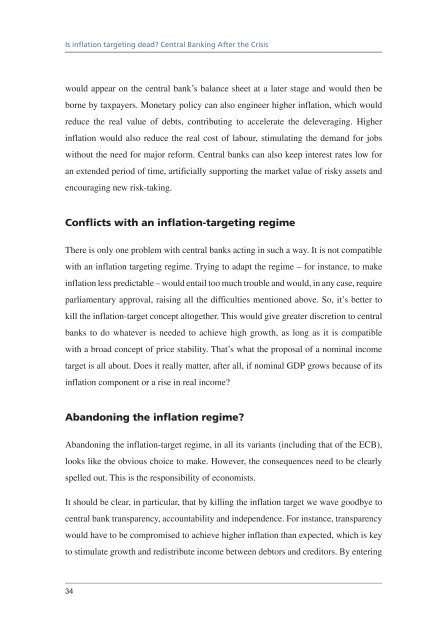Create successful ePaper yourself
Turn your PDF publications into a flip-book with our unique Google optimized e-Paper software.
Is <strong>inflation</strong> <strong>targeting</strong> dead? Central Banking After the Crisiswould appear on the central bank’s balance sheet at a later stage and would then beborne by taxpayers. Monetary policy can also engineer higher <strong>inflation</strong>, which wouldreduce the real value of debts, contributing to accelerate the deleveraging. Higher<strong>inflation</strong> would also reduce the real cost of labour, stimulating the demand for jobswithout the need for major reform. Central banks can also keep interest rates low foran extended period of time, artificially supporting the market value of risky assets andencouraging new risk-taking.Conflicts with an <strong>inflation</strong>-<strong>targeting</strong> regimeThere is only one problem with central banks acting in such a way. It is not compatiblewith an <strong>inflation</strong> <strong>targeting</strong> regime. Trying to adapt the regime – for instance, to make<strong>inflation</strong> less predictable – would entail too much trouble and would, in any case, requireparliamentary approval, raising all the difficulties mentioned above. So, it’s better tokill the <strong>inflation</strong>-target concept altogether. This would give greater discretion to centralbanks to do whatever is needed to achieve high growth, as long as it is compatiblewith a broad concept of price stability. That’s what the proposal of a nominal incometarget is all about. Does it really matter, after all, if nominal GDP grows because of its<strong>inflation</strong> component or a rise in real income?Abandoning the <strong>inflation</strong> regime?Abandoning the <strong>inflation</strong>-target regime, in all its variants (including that of the ECB),looks like the obvious choice to make. However, the consequences need to be clearlyspelled out. This is the responsibility of economists.It should be clear, in particular, that by killing the <strong>inflation</strong> target we wave goodbye tocentral bank transparency, accountability and independence. For instance, transparencywould have to be compromised to achieve higher <strong>inflation</strong> than expected, which is keyto stimulate growth and redistribute income between debtors and creditors. By entering34



